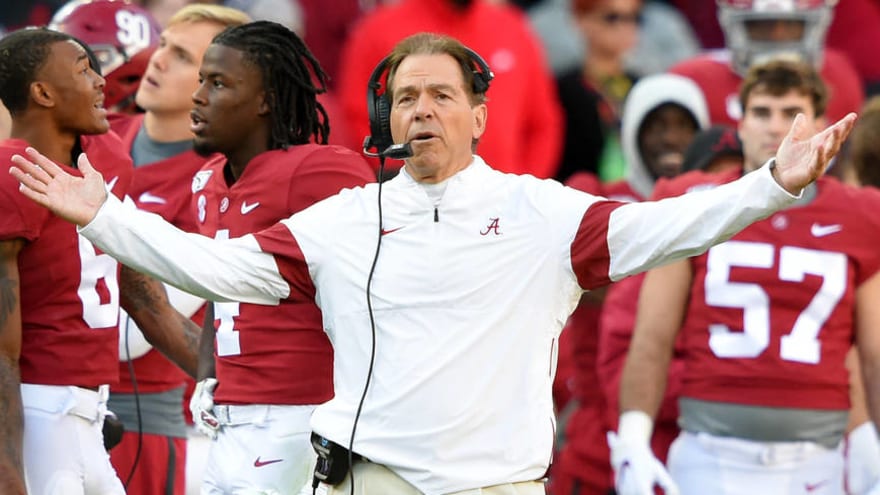According to a cabal of human beings whose jobs are to gather in a room and subjectively rank college football teams, Alabama is fifth-best in the country. Normally this would be a good thing. Normally this would put the Crimson Tide in optimal position to qualify for the College Football Playoff for the sixth straight season, meaning it would continue its streak as the only team to make the Playoff in every year of its existence.
But something happened Saturday to put that in jeopardy: Quarterback Tua Tagovailoa went down with a gruesome and disheartening hip injury that ended his season. This means the Crimson Tide now is relying on a guy named Mac to win its final two games. It also means that Alabama (9-1), according to the conventional wisdom, may have only a slim chance of making the Playoff if everything plays out as expected these next few weeks.
I do not expect you to feel much sympathy for Alabama, even if you are a Tide fan. This is a team that has experienced more prosperity over the past decade than pretty much any other program in the 150-year history of college football. If the Tide doesn’t make the Playoff, it will not tarnish Nick Saban’s legacy as (probably) the greatest coach in the sport, and it will likely not have any long-term effect on Alabama’s success.
But it very well could impact the future of the Playoff itself.
Let’s presume Alabama wins out and beats Auburn soundly to finish 11-1. If the people in that room decide that Alabama is not Playoff-worthy, it will spark complaints that one of the four most purely talented teams in the country is being left out, which could lead to a conversation about whether the Playoff should be expanded. And if the people in that room decide Alabama is one of the four best teams … then it could lead us straight to that same conversation.
Listen, we knew this was coming from the moment the Playoff was announced. There are five major conferences, and there are four Playoff spots. In some years as few as three conferences have been represented. But this year it feels like every conference has a legitimate contender. In addition to Ohio State and Penn State, Minnesota may be worthy of consideration in the Big Ten. The Pac-12 has Oregon and Utah, the Big 12 has Oklahoma and the ACC has Clemson. And the SEC? It has three teams: LSU, Georgia and Alabama.
It seems likely that LSU and Georgia will sort themselves out in the SEC championship game. But Alabama? The Tide’s loss to LSU means it likely won’t play in that game. So a one-loss conference champion from the Pac-12 — or perhaps Oklahoma if it wins the Big 12 championship game — could eclipse the Tide in the final week of the season.
This all goes back to that larger issue of how much a conference championship should be weighted over things like the ever-elusive “eye test.” In these first five years of the Playoff, it felt like it hasn’t mattered much at all, and a lot of that has had to do with Alabama’s perceived dominance. It gets even more interesting if Alabama looks great these next couple of weeks, even without Tua, because then we find ourselves at a tipping point.
Would the committee really take this Alabama team over a clear-cut conference champion? Would Alabama be left out in favor of a conference champion that doesn’t have the same level of overarching talent?
I don’t know the answer to that. For the first time since the Playoff began, I’m not entirely sure how this might shake out. And I honestly don’t know what the future of the Playoff would look like or if it should be expanded to six or eight teams. But I am hopeful that this year’s denouement will spur the conversation that many of us are at least hoping to have regarding the long-term future: Is a four-team Playoff as good as it gets?
By: Michael Weinreb




